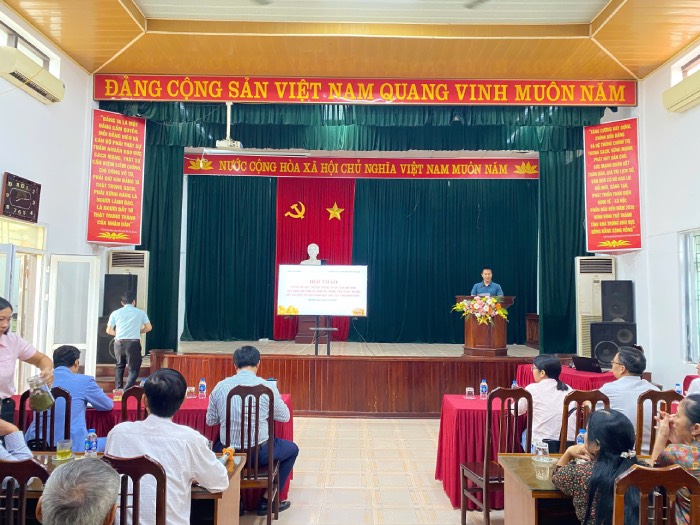"Specificate" coastal honey drops
The coastal beach area of Kim Son is famous for its vast swallow forests, which create an abundant source of natural flowers. This is a unique "honey grain" that not every locality has. However, for many years, Kim Son honey has been mainly produced on a small scale, lacking identification codes, lacking transparent information, making it difficult to compete with similar products on the market.
The change only really began when electronic traceability stamps were deployed. At 27/7 Bees Cooperative (Kim Dong Commune), the entire process from caring for the bee colony, collecting honey every day, transporting, and unenting the packaging is now recorded in photos and videos, updated directly to the TXNG system. When consumers scan the QR code, the entire journey of the product will be displayed clearly and transparently.

Mr. Ta Duc Tai, Deputy Director of the Cooperative shared: "It is difficult to prove how good the honey was in the past. Since traceability, the product has been standardized, achieved standard moisture, and is not fermented, so it is easy to enter the supermarket system and clean food chain. The value of the product has increased, the market has also become more open".
Not only 27/7, Kim Son Seaweed - Seaweed Cooperative (Binh Minh commune) supplies about 10 tons of honey to the domestic and foreign markets each year. Director of Vu Manh Thang Cooperative said: "Requirements such as not allowing bees to feed sugar, collecting honey using the right technique, measuring road width... are sometimes difficult for people, but in return, the products sold are at a higher price, maintaining reputation".
It is noteworthy that the younger generation is becoming the leading force in bringing technology into agriculture. Mr. Vu Anh Toan, Director of Kim Son Southern and Durian Honey Trading Joint Stock Company with a scale of 700 beehives shared that revenue increased by 10-20% thanks to the electronic QR code: "Customers are more assured when they know that the products are clean and not mixed. Enterprises manage processes well, reduce losses and save time".
Digitizing agriculture - from changing habits to building brands
Since mid-2024, Ninh Binh has implemented a scientific topic "Building a model to apply the traceability system for some honey products of Ninh Binh province" in Kim Dong, Binh Minh and Dong Thai communes. This is a concrete step in implementing the policy of digital transformation of agriculture towards transparency, traceability - comparison - connection.
The special feature of the model is the combination of both technological elements and cognitive changes. Deputy Head of the Ninh Binh Standards, Metrology and Quality Department Trinh Dinh The emphasized: Export is not only a management tool but a mandatory condition if you want to include agricultural products in the modern distribution chain. The honey model is just the beginning, we will expand to many other unique products".
Not only changing the way of doing things, TXNG also increases economic efficiency. After a year of implementation, the selling price of traceable honey at many establishments increased by 10 - 15%, the product was signed by clean food stores for stable consumption. People are excited because "doing the right thing - get the price - do not worry about fake tea".
Secretary of the Kim Dong Commune Party Committee Hoang Trong Le commented: "Using TXNG is a suitable direction in building the brand "Ninh Binh Honey is clean and safe". Previously, people only focused on output, now they are interested in processes, hygiene, and quality - that is the fundamental change".
Towards a digital agricultural product ecosystem
From a pilot model, Ninh Binh is setting a larger goal: building a digital agricultural product ecosystem in the whole province, in which the origin is traced as the "backbone". The steps are set out to include: Expanding TXNG for key OCOP products, organizing digital skills training for staff and farmers, building a digital map of the production area associated with geographical indications, connecting traceability products with e-commerce and creating a platform for quality monitoring and the production environment.
The benefits are not just in the economy. Adhering to the clean process helps protect the mangrove forest ecosystem, diversify biodiversity and reduce the use of chemicals. Kim Son coastal bee farming has therefore developed more stably, with less risks and more sustainably.
If in the past, consumers could only evaluate the product through experience, now with just one QR code scan, the entire journey of a drop of honey - from the bee box to the finished bottle - is fully displayed. Trust is built with data, evidence, and standard processes.
For Ninh Binh, TXNG is not only an application of technology but also a way for the story of local agricultural production to be told in the most realistic, transparent and convincing way. When trust is built, brands are identified, new agricultural products have the opportunity to break through in an increasingly competitive market.












